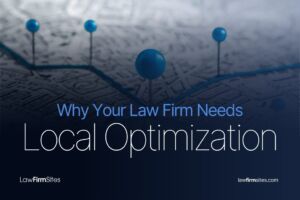Law Firm Sites FAQs-Pt. 1

Law Firm Sites Frequently Asked Questions
Part 1
Q: What is a Meta Description?
A: The meta description is the text, just below the web page title. A user will see this when your legal website shows up in the search results. This text gives a quick, 160 character summary of what the content on the page contains. The meta description used on Law Firm Sites isn’t something that will show up on the web page itself, as it is something that search engines parse from the code and use to display descriptions on the search engine results page.
Q: Why Is a Meta Description Important?
A: When it comes to law firm site marketing, it’s not only important to show up in the first set of search results, it’s also important that the searcher clicks through to your page. Obtaining that click-through can be done by writing compelling meta descriptions. This is the space you can use to sell why someone should visit a particular page on your website. Since most readers only quickly scan search engine results to determine which results they will click on, it is important to grab attention as quickly as possible.
Creating readable and compelling meta descriptions using targeted keywords increases the draw to your website and services. A meta description by itself will not increase your search engine rankings. However, in combination with a full page optimization and keyword placement, meta descriptions help to promote your firm and its services to search engines like Google. Meta descriptions provide the first step of marketing for your law firm. As well as telling potential clients what pages consist of and how you can assist them.
Q: What is a DNS server?
A: A DNS server is a computer server which has a database containing IP addresses which are public as well as the hostnames which are connected to those public IP addresses. The purpose of a DNS server is to alter those public IP addresses, also known as common names, into IP addresses when utilized. If you want to know what it does in more simple terms, it transforms the URL you type into the URL bar of your browser into the corresponding IP address. You can discover this specific information by utilizing a search engine and looking at the appropriate results.
Q. How much will an attorney website cost to be designed?
A: The cost is dependent on many factors. Number of pages, custom graphics, search engine optimization, hosting needs, maintenance and custom programming all pay a large factor in the price. The average law firm will pay roughly $3,000 – $4,500 to have their legal website designed.
Q. How do I get new clients from Google and the other search engines?
A: Search Engine Optimization is the word used today to describe the marketing done on your legal website to get high ranking and thus new clients to your website. Google, Yahoo and MSN are the largest search engines. There are many who profess to have the “magical solution” to get first page ranking on Google. The truth of the matter is if you want to get high ranking for your attorney website you simply have to upload additional pages monthly. As well as making sure you have a fast loading website and you know what your competition is doing. The search engine ranking world is a free market. Those with the best stuff end up on top. Those who pay little attention to their site and don’t check their competitors improvements will fall behind.
Q. How long does it usually take to build a legal website?
A: The average time it takes to build a legal website is 2 months.
Q. What is a blog and do I need one?
A: A blog (web log) is something you are reading right now. People blog about different topics such as sports, politics or religion on the internet today. A blog is helpful to keep fresh content on your website. It is an easy tool to use and as simple as writing an email. It is recommended for any law firm that wants to get higher ranking.
Q: Website Hosting: What and Why’s
A: Website hosting is when you pay a website hosting service to allow your website to be accessible on the Internet. There are a variety of website hosting services, some of which may be better for a legal website. Website hosting operates via the website hosting service saving your website files onto web servers. These are are powerful computers and connect those to a reliable, yet quick network. This service is necessary to your company’s success. It allows your customer easy access to your website, whether you run a legal website or something else. Thankfully, these services are typically fairly cheap.
Q: How do I find out who is hosting my legal website?
A: There are many methods for discovering who is hosting your site. If you used a website hosting service like those mentioned earlier, you can just check your records and find the answer. If you do not have your records intact, you can visit a variety of websites. Simply enter the domain name of your lawyer website to figure out who is hosting it. You can also choose to pay for this information, although there are free many sources available. Either way, it is quite simple and easy to find out. Also, you should look for services which provide detailed information.
Q: What is a Registrar?
A: One of the most common questions regarding a lawyer website or any other type of website is what is a registrar. A registrar is also known as a domain name registrar. It is a company which is made to provide the registration of domain names to other businesses. Or, perhaps individuals who want to possess a certain web address. Those who want to maintain their site’s registration pay the registrar a fee. This ensures no one else can utilize the same address. Its role regarding the domains and logins is that it keeps them all registered for a certain fee so they’re exclusive.
Q: What information should I know about my attorney website?
A: The first piece of information you should know is whether or not the website login credentials are reliable. You can check this by seeing what credentials are used to verify one’s identity. The second piece of information to know about your Law Firm Sites is the cpanel or control panel and how easy it makes navigating the website. Another piece of information you should know about your Law Firm Sites is the variety of content management system used. And, if it presents the information in a professional manner. Finally, the attorney website’s social media platforms is a useful source of information.
Did you like this post? Here are some others you might enjoy:

Whether you are launching a new firm or breaking off to promote your brand, your legal website is the heart…

Search Engine Optimization (SEO) has become a critical tool for law firms to stand out. It drives more visitors to…

It’s easy to forget that every business is a ‘local’ business to someone. This is especially true for legal firms and attorneys who often…

